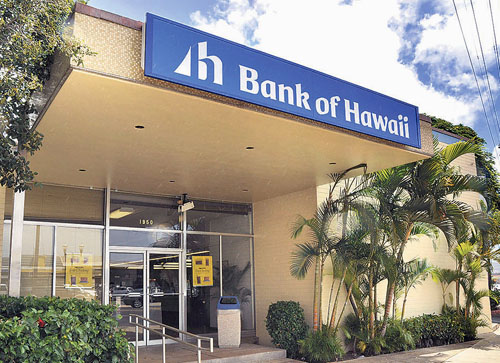Bankoh settles suit for $9M on improper overdraft fees

Bank of Hawaii has settled its class-action lawsuit for $9 million. The settlement, which was agreed to Friday, is subject to documentation and court approvals. Here is Bank of Hawaii’s Kalihi branch.
Every Bank of Hawaii customer with a debit card who had more than one overdraft fee in a day during the past five years will be able to share in a $9 million class-action lawsuit settlement.
The state’s second-largest bank said Monday it reached a tentative settlement arising from claims that the bank improperly charged overdraft fees on debit card transactions. Bank of Hawaii said the proceeds would be put into a settlement fund that will be used to refund customers and pay attorneys’ fees, administrative and other costs in exchange for a complete release of all claims against the company.
Similar suits against American Savings Bank and Central Pacific Bank, the state’s third- and fourth-largest banks, are still proceeding.
Attorney John Perkin of Honolulu-based firm Perkin & Faria LLLC said he didn’t know the exact number of Bank of Hawaii customers eligible for the refunds, but said it will be “a large number.”
Perkin and three mainland law firms filed the Bank of Hawaii suit in February.
“They (bank customers) could legitimately get back what they lost from the overdraft charges,” Perkin said Monday. “How much depends on how many overdraft charges they incurred. Those who have meticulously kept their account in order and never had an overdraft aren’t members of the class.”
Don't miss out on what's happening!
Stay in touch with breaking news, as it happens, conveniently in your email inbox. It's FREE!
The settlement, which was agreed to on Friday, is subject to documentation and court approvals, according to a Bank of Hawaii filing with the Securities and Exchange Commission. Perkin said the amount the attorneys receive will be determined by the court.
Bank of Hawaii spokesman Stafford Kiguchi said the terms of the agreement preclude the bank from commenting on the settlement.
The complaint, filed in state Circuit Court on behalf of Honolulu residents Lodley and Tehani Taulava, accused the bank of engaging in a policy of reordering debit card transactions from highest dollar amount to lowest dollar amount. The suit said this practice allowed the bank to deplete the customer’s available funds as quickly as possible while maximizing the number of overdraft fees.
When asked about the suit in February, Kiguchi said the bank changed its policy in January and now generally posts transactions from lowest dollar amount to highest. He referred to those comments Monday and declined to elaborate further.
Perkin said the case was resolved “amicably” with Bank of Hawaii, which “has shown a sense of commercial good faith in stepping up to the plate.”
He said the five-year period will extend through January of this year when Bank of Hawaii changed its overdraft policy.
Analyst Joe Gladue, who follows both Bank of Hawaii and Central Pacific Bank for Haverford, Pa.-based B. Riley & Co., called Bank of Hawaii’s settlement “in the ballpark” of what he has seen with similar lawsuits.
“Consider what it would take the bank to litigate this lawsuit,” he said. “It would be several million dollars, maybe less than $9 million, but they probably said, ‘Let’s get this out of the way’ because it might be in that range anyway. It also takes a lot of time and attention, and it would be a nuisance. If they settle it this way, it may be cost-effective rather than litigating it.”
Gladue said Bank of Hawaii’s $9 million settlement might not be indicative of how much American Savings and Central Pacific could pay if they decided to settle.
“A couple of variables come into play — what their overdraft fees are comparable to other banks, as well as the size of the banks,” Gladue said. “If you’ve got more depositors at one bank, that’s going to have some impact on what the settlement might be.”
Central Pacific spokesman Wayne Kirihara said Monday the bank cannot comment because the case is in mediation.
American Savings spokeswoman Laurie Komatsu said the case is currently proceeding through the legal system, and the bank cannot comment on any specifics of the case.
“We believe our business practices are fair, legal and transparent and that we will prevail when all the facts are presented,” she said.
Perkin said American Savings recently lost a motion to have the case dismissed.





